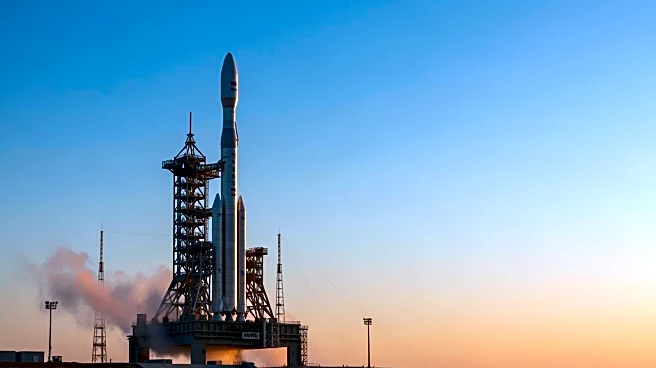What's Happening?
United Launch Alliance (ULA) is set to launch an Atlas 5 rocket carrying a communications satellite for Viasat from Cape Canaveral Space Force Station. The launch, initially delayed due to a faulty liquid
oxygen tank vent valve, is rescheduled for Thursday night. The 6-metric-ton satellite will be deployed to a geosynchronous transfer orbit approximately 3.5 hours after liftoff. The Atlas 5 rocket, in its 551 configuration, will produce about 2.7 million pounds of thrust at liftoff, supported by five solid rocket boosters. The mission marks the second satellite in the ViaSat-3 series, aiming to enhance Ka-band network capabilities over the Americas.
Why It's Important?
The successful deployment of the ViaSat-3 satellite is crucial for expanding broadband capabilities across the Americas, providing more than 1 terabits per second of capacity. This launch represents a significant step in Viasat's strategy to enhance its network offerings, including platforms like Viasat Amara and NexusWave. The mission also highlights ULA's role in supporting commercial satellite launches, contributing to the growing demand for satellite-based internet services. The increased capacity and dynamic beam forming capabilities of the satellite are expected to benefit customers by efficiently deploying bandwidth to high-demand areas.
What's Next?
Following the launch, the ViaSat-3 F2 satellite will undergo months of on-orbit testing before entering service in early 2026. ULA plans to retire the Atlas V rocket after completing its remaining missions, including launches for Boeing's CST-100 Starliner and Amazon's Project Kuiper. The successful deployment of the satellite will further solidify Viasat's position in the satellite communications market, potentially influencing future partnerships and technological advancements in satellite broadband services.
Beyond the Headlines
The launch underscores the importance of reliable satellite technology in bridging digital divides and enhancing global connectivity. As satellite internet becomes increasingly vital, companies like Viasat are positioned to play a key role in shaping the future of telecommunications. The mission also reflects broader trends in the aerospace industry, where reusable and cost-effective satellite solutions are gaining traction.












